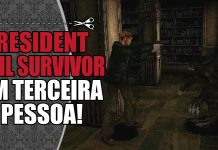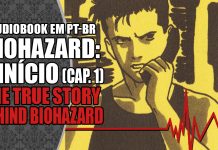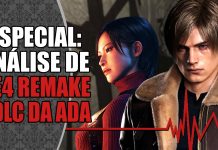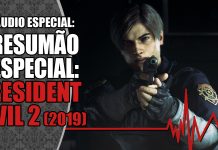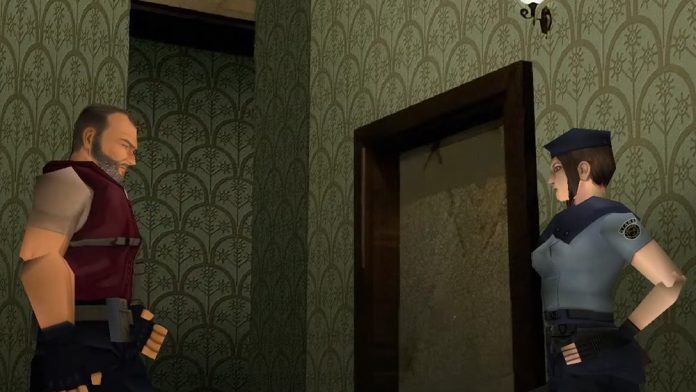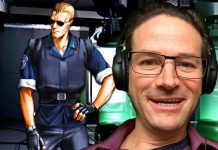Há 20 anos, o mistério sobre a identidade dos dubladores e atores da abertura live-action do primeiro Resident Evil, lançado em Março de 1996, permanece e inquieta os fãs da franquia. Mas como nós do Resident Evil Database somos teimosos e persistentes, conseguimos preencher ao menos um pedaço deste quebra-cabeça, e quem nos ajuda a desvendar alguns dos mistérios é Barry Gjerde, narrador e dublador no Japão, e o dono da voz original do personagem Barry Burton no Resident Evil “classicão”, de 1996. Já adiantamos que a entrevista é longa, então senta que lá vem história!
Entrevista Traduzida:
Obrigada por nos conceder esta entrevista especial, Barry. Você poderia nos contar como e quando surgiu a oportunidade de trabalhar no processo de dublagem do primeiro Resident Evil / Biohazard?
Barry Gjerde: Meus registros mostram que eu gravei minhas falas para “Bio Hazard”, como “Resident Evil” é conhecido no Japão” em dois dias separados: no Sábado, dia 12 de Agosto de 1995, e na Terça, dia 5 de Setembro de 1995, no estúdio Vision Universe Annex em Tóquio. (O estúdio tinha um nome diferente, mas eu não me lembro, e possivelmente ele nem exista mais.)
Eu consegui o trabalho através de uma das muitas agências com as quais trabalho. Eu não sabia até pouco depois que o jogo era chamado “Resident Evil” em outras partes do mundo.
Por favor, conte-nos um pouco sobre os bastidores do projeto: qual era a expectativa para o jogo na época? A dublagem aconteceu toda no Japão?
Eram meados de 1990 e o Japão estava nos primórdios em termos de produção de games para consumo mundial. Há certas exigências para cada jogo que eu faço, mas não me lembro de nenhuma sobre este jogo. Isto não quer dizer que não existissem. Eu não estava envolvido em nenhum planejamento deste jogo. Eu sabia que seria um lançamento mundial, mas para mim, pessoalmente, era só outro jogo que me mandaram fazer. Eu fiz outros jogos antes de “Bio Hazard”, e muitos outros depois. Não fazia ideia de que se tornaria famoso, ou no caso, “infame”!
Quando à segunda pergunta, eu não sei exatamente se toda dublagem foi feita no Japão, novamente porque não estava envolvido no planejamento ou na coordenação. Eu só trabalhei como dublador para o meu papel, Barry Burton, e fiz algumas vozes de fundo e partes de barulho. No entanto, nunca ouvi falar de outras dublagens feitas em outro lugar.
O primeiro Resident Evil é conhecido pelo “ar amador” na dublagem, pelo menos é a opinião geral dos jogadores: as frases são superficiais e os diálogos não são naturais para a situação. O que você acha disto e porque acha que o resultado final do processo foi este?
Sua pergunta é muito boa. Há muitas razões. A primeira, as frases. Algumas das frases foram mal escritas. Eu tenho pelo menos quatro teorias para isto. (Importante: Estas são minhas próprias opiniões, baseadas na experiência de 27 anos no mundo da narração em inglês no Japão. Não fazem parte do que aconteceu; na verdade, são hipóteses do que pode ter acontecido.)
1. O roteiro pode ter sido uma tradução de Japonês para Inglês. Neste caso, quero dizer que um falante nativo de inglês fez a tradução do japonês original. Porém, como foi um projeto “made in Japan”, pode ter havido alterações por falantes não-nativos de inglês, tomando decisões sobre, sendo que não eram qualificados para isto, em termos de nível de natividade. Mesmo se este fosse o caso, tenho certeza de que eles acreditavam que estavam melhorando o roteiro.
2. O roteiro pode ter sido traduzido por um japonês, que não é falante nativo de inglês, e depois reescritas por um revisor nativo de inglês, mas algumas das sugestões de alterações podem não ter sido aceitas. Podem ter tido alterações de outros não-nativos de inglês também. Parte do inglês em “Bio Hazard” é natural, parte não é. Sim, há várias frases infames e lamentáveis, mas em outros casos também há frases estranhas e não construídas da forma como um falante nativo do inglês norte-americano diria as coisas.
3. O roteiro pode ter sido originalmente escrito em inglês por um não-nativo (ou vários), e depois editado tanto por nativos quanto por não-nativos de inglês.
4. Qualquer combinação possível das alternativas acima.
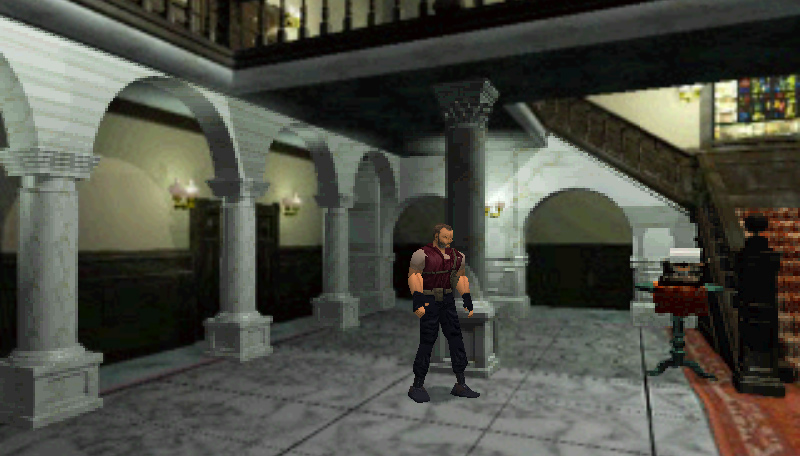
Ultimamente, eu venho narrando mais produções corporativas. Mas acho que os roteiros em inglês ainda podem ser um problema. O vídeo e a música de fundo é ótima, mas o roteiro preparado pelo cliente pode ser decepcionante. Felizmente, muitos clientes (e as companhias de produção que contratam) têm recursos e senso comum de usar tradutores profissionais (o recomendado) ou revisores. Isto faz toda a diferença, e esta companhia, potencialmente, terá um roteiro que os represente bem.
A segunda razão, o estúdio. O estúdio de gravação não era capaz de abrigar vários dubladores na cabine ao mesmo tempo. A cabine era pequena: coisa de 1.5m de largura por 2m de altura. Algumas vezes eu gravei minhas frases sozinho na cabine, o que foi ótimo. Outras vezes, mais de quatro dubladores estavam na cabine ao mesmo tempo. Ficávamos quase um em cima do outro, nos esquivando para permitir que o próximo dublador fizesse suas falas na frente de um microfone. Sim, um único microfone!
Se há quatro narradores, o ideal é que seja uma cabine maior com quatro microfones separados. Os microfones dos dubladores que não estivessem falando ficariam sem áudio quando possível. Isto reduz qualquer barulho estranho: de atores respirando e de movimento corporal, e o barulho causado pelo manuseamento dos roteiros em papel.
Terceira, o orçamento. Ah, sim, o orçamento. Talvez o estúdio tenha sido escolhido porque era razoavelmente barato. Quanto maior e melhor o estúdio, melhor o produto e mais alto o preço, sem falar na equipe melhor do estúdio. Eu, no entanto, já estive em estúdios pequenos e o som estava ótimo! Tenho a sensação de que não havia um grande orçamento para este projeto. Com um orçamento adequado, há mais tempo para se dedicar em refazer falas dos dubladores. Assim como nos filmes, a primeira tomada não é necessariamente a melhor. Mais tomadas exigem mais tempo, e o tempo no estúdio custa caro. O orçamento é um fator muito maior ao determinar o sucesso ou falha de qualquer projeto. Em termos de videogames, um bom orçamento pagaria por escritores, tradutores, estúdio, atores e produção apropriados… além do tempo!
Quarta, os dubladores. Os dubladores com quem trabalhei em “Bio Hazard” eram americanos e canadenses. Se os atores eram de outra nacionalidade, eu não sei. Não trabalhei com todos os dubladores envolvidos em todo o processo de gravação, já que projetos assim não são gravados em ordem linear (no caso, do começo ao fim na ordem da história). Isto ocorre devido às questões de logística de contratação e disponibilidade dos dubladores, e maximizar o uso do estúdio com as gravações do dublador etc. Alguns dos dubladores que eu conheci me disseram que estavam trabalhando em dublagem pela primeira vez. Não me lembro de seus nomes.
Eu me lembro de Scott McCulloch (Chris Redfield) e Lynn Harris (Rebecca Chambers). Scott era um DJ famoso da rádio Inter FM em Tóquio, e nós costumávamos nos encontrar de tempos em tempos em estúdios, na rua, em festas de agências. Ele era de Victoria B.C., canadense.
Infelizmente, Scott faleceu em 24 de Setembro de 2000. Ouvi dizer que alguns fãs de Resident Evil falaram que isto não é verdade, que ele não morreu. Mas é verdade! Eu fui ao funeral dele e vi Scott lá, diante de mim, em um caixão aberto. Eu também conheci sua viúva e sua filhinha. Isto teve grande impacto em mim. Tendo viajado para a Índia, eu já havia visto cadáveres antes em Varanasi; uma vez também em Taiwan, de um jovem na rua, morto por um caminhão. Mas nunca havia visto um amigo morto em um caixão. O funeral de Scott foi na Sexta, 29 de Setembro de 2000. Nunca me esquecerei. Muitos membros da comunidade estrangeira de dublagem em Tóquio foi prestar homenagem. Ele era muito conhecido por seu programa de rádio na Inter FM, na época, uma estação na maioria do tempo em inglês. A mãe do Scott e a irmã também estavam lá, vindas do Canadá.

A foto acima é a única que tenho de Scott McCulloch. Ele está à direita, segurando um telefone e fazendo careta. Seu cabelo estava amarrado para trás em um rabo de cavalo. Este é o Scott McCulloch que dublou o personagem Chris Redfield. A foto foi tirada na década de 90, em uma festa de Ano Novo de uma agência de narração em Tóquio. Se você reparar, vai ver os topos das cabeças de outras pessoas na foto. Obviamente eu bloqueei os rostos delas para manter a privacidade. Eu sou o rapaz à esquerda, também segurando um telefone.

Há outro ator com o nome de Scott McCulloch (LINK no IMDb). A foto acima é do “OUTRO Scott McCulloch”.
 [NOTA DO RESIDENT EVIL DATABASE: temos a confirmação direta do ator de que ele NÃO participou das filmagens da abertura de Resident Evil, veja na imagem à esquerda.] Não sei de onde ele é. Na verdade, de acordo com o site IMDb, há várias pessoas com este nome. O ator acima geralmente é mostrado na Internet como o dublador de Chris Redfield. Sem querer ser desrespeitoso, este outro Scott McCulloch NÃO FEZ a voz de Chris Redfield no jogo “Resident Evil / Bio Hazard”. Se este é o ator que esteve na abertura original em live-action, eu não sei, mas não acho que seja. Nenhum dos outros “Scott McCullochs” apareceram como dubladores em Resident Evil também. Acho que o IMDb (ou outra pessoa) confundiu a situação misturando dados para mostrar vários créditos, que são de dois Scott McCullochs diferentes que apontei aqui. Acho que é por isto que algumas pessoas acham que o DJ Scott McCulloch ainda esteja vivo. Há uma grande confusão entre estes dois atores com o mesmo nome.
[NOTA DO RESIDENT EVIL DATABASE: temos a confirmação direta do ator de que ele NÃO participou das filmagens da abertura de Resident Evil, veja na imagem à esquerda.] Não sei de onde ele é. Na verdade, de acordo com o site IMDb, há várias pessoas com este nome. O ator acima geralmente é mostrado na Internet como o dublador de Chris Redfield. Sem querer ser desrespeitoso, este outro Scott McCulloch NÃO FEZ a voz de Chris Redfield no jogo “Resident Evil / Bio Hazard”. Se este é o ator que esteve na abertura original em live-action, eu não sei, mas não acho que seja. Nenhum dos outros “Scott McCullochs” apareceram como dubladores em Resident Evil também. Acho que o IMDb (ou outra pessoa) confundiu a situação misturando dados para mostrar vários créditos, que são de dois Scott McCullochs diferentes que apontei aqui. Acho que é por isto que algumas pessoas acham que o DJ Scott McCulloch ainda esteja vivo. Há uma grande confusão entre estes dois atores com o mesmo nome.
[No IMDb] A metade inferior da página mostra uma lista de jogos, enquanto a parte superior a partir de 2004 e adiante são indicativos de “curtas”, filmes e uma série de TV. Você vai reparar que há créditos de jogos (“Time Crisis II e 3”, “Time Crisis: Crisis Zone”, “Tekken 5”) que estão listadas como tendo sido lançados DEPOIS de 2000, o ano em que Scott morreu. Isto é pelo fato de sua voz e frases de versões anteriores dos jogos terem sido reutilizadas nestes outros jogos.
Mudando de assunto… Eu me lembro que a atriz que dublou Jill era de Northern Alberta, Canada, e ela estava perguntando a outro dublador canadense se ele havia estudado no NAIT (Instituto de Tecnologia de Northern Alberta), que fica em Edmonton e foi onde ela estudou. Não lembro do nome dela, mas não era a primeira vez que ela dublava. Acho que ela fez a parte dela muito bem.
E além de ter sido a diretora, Lynn Harris também apareceu em “Bio Hazard / Resident Evil” no papel de Rebecca Chambers. Apesar de Ward Sexton e Dean Harrington também terem trabalhado no jogo, suas datas de gravação devem ter sido diferentes da minha, já que não os encontrei no estúdio.
Que nível de contato você teve com a equipe de desenvolvimento do jogo, em termos de receber informações sobre a criação do personagem? Que tipos de detalhes sobre o personagem você recebeu para dar vida a ela adequadamente?
Não houve contato com a “equipe de desenvolvimento”. A equipe de desenvolvimento provavelmente estivesse trabalhando na sede da Capcom, que eu acredito que seja em Osaka, ou em algum escritório em Tóquio. Acho que recebemos papéis impressos nos contando um pouco sobre a história e nossos personagens. Me lembro de estar na sala principal do estúdio e alguém estava explicando a trama do jogo etc., mas faz 20 anos… Minha memória desta parte é vaga.
Barry se tornou famoso por algumas frases que são mais engraçadas do que deveriam ser, e uma das mais conhecidas é a do “você quase virou um sanduíche de Jill”. Estas frases foram improvisadas por você ou estavam mesmo no roteiro?
Barry Burton tinha mesmo algumas frases estranhas. Não, eu não improvisei as falas. Repito: eu não as inventei! Me lembro de ter ficado surpreso ao vê-las pela primeira vez. Eu as fiz porque elas estavam no roteiro. Como dublador, fiz o meu trabalho. Além do mais, não houve qualquer comentário do(s) diretor(es) sobre estas frases. Os roteiros haviam sido aprovados. Como dublador, você não reclama demais se quiser continuar no trabalho. Então, eu fiz as frases e, subsequentemente, fui severamente criticado por elas na internet.
Para aqueles que não sabem, uma sessão de gravação não é uma democracia. É o desempenho em cima do roteiro que é criado após longo preparo e tomadas de decisões por pessoas que os dubladores (geralmente) não conhecem. Tudo isto faz parte do grande processo, relacionado ao orçamento, parte com a qual eles pagam os dubladores e outros. O dublador está lá para fazer as frases escritas por alguém, e sob a direção do diretor, que trabalha para satisfazer a visão do cliente. Os roteiristas são muito importantes, provavelmente até mais do que os dubladores.
Antes de Resident Evil, você trabalhou na dublagem de outros jogos? E depois, em que outros jogos você esteve?
Sim, eu trabalhei em jogos antes de “Resident Evil” e em muitos depois. Em muitos casos, eu nunca soube os nomes dos jogos, apenas para qual empresa o trabalho era, qual agência, data do trabalho e quanto me pagariam. A década de 90 foi bem cheia para narrações. Estes jogos eram dos primórdios da produção de games no Japão. Eles eram focados para mercados internos, mercados externos e algumas vezes para ambos. Frequentemente, simplesmente não sabíamos. Eu nunca criei uma lista de jogos em ordem cronológica. Para games antes de “Resident Evil”, tente “Tekken 2”. Eu também fiz “Fighter Pilot” (nome incerto) e “Soul Edge”, ambos para a Namco. Para games depois de “Resident Evil”, é melhor dar uma olhada no IMDb.
O ator que fez Barry Burton é conhecido apenas como “Gregory” e se parece bastante com você. Por anos, a imagem dele foi associada à sua, como se ator e dublador fossem a mesma pessoa. Você poderia esclarecer esta situação, por favor? Falando nisto, por que você acha que a Capcom não deu os devidos créditos aos atores com seus nomes reais (e os dubladores sequer foram creditados)?
Eu nunca, jamais me chamei Gregory! Nem nunca usei este nome. Possivelmente, Gregory seja o nome do ator live-action, ou talvez tenha sido inventado? Não sei. Eu ficava (e ainda fico!) muito surpreso ao ver pessoas escrevendo em blogs de internet como se fossem experts em mim e em outros dubladores. Existem tantos, tantos erros e informações incorretas. Vocês ficariam chocados.
Por que não há os devidos créditos? Por dinheiro, é o mais provável. Não se esqueça, não havia um sindicato para os dubladores estrangeiros.

Sobre a foto acima, a pessoa à esquerda NÃO sou eu. Eu não sei o nome dele. Eu estou à direita, com o microfone. Minha foto foi tirada em um estúdio de gravação em Tóquio.
O personagem tem o mesmo nome que você. Ao menos, Barry é o nome profissional que você usa como narrador no Japão, certo? Dublar o Barry foi só uma coincidência ou seu nome acabou influenciando no nome do personagem?
“Barry” não é meu nome profissional, por assim dizer. Me deram este nome Barry quando minha família se mudou da Noruega para o Canadá quando eu era mais jovem, e eu me chamo Barry desde então, ou seja, durante a maior parte da minha vida. Meu nome norueguês não funciona muito bem em inglês. Mesmo no Japão, eu sou chamado de バリー (BARI).
O fato de um dos personagens em “Bio Hazard” também ser “Barry” foi totalmente coincidência, até onde eu saiba. Eu não tive nada a ver com a criação do personagem “Barry Burton“.
Você já teve a chance de ver o resultado final do seu trabalho em Resident Evil? O que você acha da dublagem em um todo do jogo? E como foi a repercussão em torno de você, por fazer parte do jogo, mas não ser devidamente creditado?
Eu tenho uma cópia do jogo e meu filho uma vez me mostrou como era na tela. Não era ruim, mas eu nunca joguei. Mas eu ouvi alguma das vozes através de postagens na Internet.
Na década de 90, apesar de às vezes participar de jogos como dublador, eu trabalhei como narrador em vários gêneros diferentes de narração, de comerciais de TV e de rádio a promoções de produtos em vídeos corporativos, a vídeos culturais, educacionais e médicos, fiz até mesmo alguns documentários e fui ator. Eu também fiz traduções, transcrições e revisão.
Minha esposa e eu estávamos iniciando a nossa família. Jogar videogames não era parte da minha vida, já que eu estava ocupado com família, trabalho e tocando em uma banda de rock como hobby. Mas eu gosto de dublagem como forma de trabalho.
As pessoas da minha geração raramente jogam videogame, já que computadores não fizeram parte de nossa adolescência. Pessoas nascidas nos anos 70 ou depois são mais acostumados a jogar videogame, porque, nos anos 80 e 90, havia talvez computador em suas casas, ou nas casas dos amigos. Nos anos seguintes, é claro, computadores se tornaram comuns, e os videogames foram bastante aprimorados.
Sobre não ter sido creditado, não há um sindicato de atores para dubladores estrangeiros no Japão (acho que existe um sindicato ou associação para narradores e dubladores japoneses). Em muitos jogos, não são dados os créditos, e em outros projetos, sim. O mais importante era ser pago. Eu tinha contas a pagar e bocas a alimentar, sem falar na mensalidade escolar dos meus filhos.
Mas a sua pergunta talvez seja um tanto quanto “temporal”. Você pode estar julgando a importância dos créditos pelos termos de hoje. Na época, para mim, não significava muito, porque os jogos geralmente eram produções baratas e eu não fazia parte do público que jogava. A história hoje é diferente, especialmente com a internet. Pense em toda a informação que obtemos na internet sobre jogos, filmes, livros, notícias, música e tal. Isto não existia naquela época. Hoje, o mundo é completamente diferente em termos de mídia. Alguns cliques e você consegue informação sobre quase qualquer coisa, inclusive sobre quem estava em qual jogo.
Hoje em dia, no Japão, mesmo que os dubladores de jogos e outros projetos recebam créditos, geralmente não dão créditos em projetos corporativos, e nem em alguns documentários em japonês que foram dublados em inglês. Amigos e parentes meus no Canadá viram meu trabalho em documentários na TV e um amigo me perguntou, “Por que você não recebeu créditos como narrador?”. Eu perguntei a um agente se eles me dariam créditos. Ele verificou, mas a resposta que veio foi “não”. Mas eu tinha que continuar fazendo (e ainda tenho que continuar), porque eu também tenho contas a pagar. Isto é justo? Não, não é. Mas enfim. Eu preciso trabalhar.
Se o narrador for uma celebridade famosa, então ele/ela provavelmente receberá créditos (e será bem pago). Celebridades japonesas geralmente estão em comerciais de TV, vendendo produtos. A TV japonesa às vezes usa atores americanos em comerciais, como Tommy Lee Jones e Leonardo DiCaprio, só para citar nomes. Eles também têm que “pagar as contas”.
Barry ficou sumido da franquia por muitos anos, e voltou recentemente em um novo título. O dublador tem a voz bem parecida com a sua! Você chegou a ser contatado para fazer o personagem novamente, quase 20 anos após o primeiro jogo? E antes disto, a Capcom chegou a te contatar para trabalhar novamente na série?
Eu não sabia que o Barry ficou “sumido” por tantos anos, nem que voltou, e nem que o dublador dele tem a voz parecida com a minha. Eu nunca fui chamado para fazer o personagem de novo. A Capcom nunca me contatou; mas eles nunca me contataram diretamente. Eles falam com uma agência, que então entra em contato com uma companhia de produção, que provavelmente entra em contato com um agente de dubladores, que então entra em contato comigo (ou algo assim). A cada organização ou companhia que entra, o dinheiro diminui.
Pergunta de fã: Alex Aparecido Marcolino – Como você se sente ao ver a franquia Resident Evil hoje? Já que você foi um dos responsáveis pela criação da base de fãs, as pessoas realmente se apegaram aos personagens do primeiro jogo.
Olá, Alex. Você ficará surpreso com a minha resposta. Eu não sei nada sobre a franquia “Resident Evil” hoje. Sinceramente, eu não me interesso. Não gosto do gênero terror ou suspense. Gosto de dramas policiais, médicos, histórias de advogados, ficção científica etc. Na verdade, estou assistindo “Star Trek Voyager” de novo depois de muitos anos. “Game of Thrones” é fantástico. E “Defiance” também é boa.
Pergunta de fã: Julio Henrique Hartmann Junior – Como você via o trabalho de dublagem em jogos naquela época? Poderia imaginar que a indústria e este tipo de trabalho cresceriam tanto?
Olá, Julio. Sobre dubladores em outros jogos, eu sabia bem pouco a respeito, já que não sou um jogador. Na época, eu ficava feliz por estar trabalhando e usando algumas vozes diferentes que consigo fazer. A voz do Barry Burton é bem próxima da minha voz normal, e pelo menos era há 20 anos. Mas havia equivalência na dublagem na época, como, por exemplo, soar como um monstro, ou como um vilão, um herói, e fazer vozes de “dano”, como Ugh! Oh! Ahhh! (Soco!) (Grunhido!) etc.
Eu também corrido muito do inglês em jogos, que geralmente tinham orçamento baixo. Alguns clientes insistiam que eu fizesse o inglês do jeito que estava escrito, porque os jogos eram para o mercado japonês e usados em fliperamas. Eles queriam o “inglês” que os jogadores japoneses pudessem entender facilmente, ou palavras e frases em inglês que soassem fáceis em japonês: “Ótimo tiro!”, “Bom!” etc. A influência do inglês na língua japonesa é incrível, devido à ocupação americana no Japão após a II Guerra Mundial e a resultante “invasão” da cultura americana: filmes, música, roupas, política…
Não, eu não sabia que a indústria de videogames seria tão avançada como é hoje. Eu nunca imaginei que teríamos a internet também. Eu me conectei pela primeira vez em Outubro de 1995, pouco depois de gravar “Bio Hazard”. A internet era bem jovem e inocente na época; não era perigosa como hoje. Muita coisa mudou.
Pergunta de fã: Ítalo Oliveira – O que realmente aconteceu para que os atores e dubladores usassem nomes falsos e mantivessem o seu trabalho neste projeto como secreto até hoje, 20 anos depois?
Olá, Ítalo. Eu não sei muito bem por que usaram nomes falsos ou como isto aconteceu. Mas (e isto é só especulação da minha parte)… talvez tenha algo a ver com dinheiro.
Resident Evil tem um nome forte no Japão. Você é reconhecido pelo seu trabalho na série? Já foi reconhecido por fãs por sua voz?
Algumas pessoas devem saber meu nome porque leram na internet, ou algo do tipo. Eu não me lembro de alguém ter me reconhecido como parte de “Bio Hazard” por causa da minha voz. Um funcionário de um estúdio em Tóquio me disse que conhecia minha voz. Provavelmente seja por causa dos comerciais que eu fiz (e ainda faço) para a TV japonesa (só voz), ou ouviram meu áudio de demonstração.
Na verdade, eu fico muito feliz de poder andar pelas ruas e ninguém saber quem eu sou. As pessoas famosas não têm este luxo. A fama acaba com sua privacidade.
Qual é o seu nível de contato com videogames? Você já jogou videogames alguma vez?
Eu não jogo videogames. Nunca joguei. Meu interesse fora do trabalho se resume em sua maioria em aprender chinês e japonês, além de outras línguas asiáticas que eu “gosto”. Eu vivi em Taiwan por três anos no início da década de 70 e me apaixonei pelo Mandarim. E por ter vivido na Ásia a maior parte da minha vida, gosto de viajar (sou um mochileiro!) pela China, por Taiwan, sudeste asiático, entre outros lugares.
Você ainda mora no Japão, certo? Como é o seu trabalho como narrador hoje? Está envolvido em grandes projetos no momento?
Sim, eu moro no Japão há uns 33 anos. O mundo da narração em inglês mudou ao longo dos anos, particularmente depois da Crise Financeira Global de 2008 e dos “Três Desastres” (terremoto, tsunami e acidente nuclear) no Japão, em Março de 2011. Quando digo que “mudou”, quero dizer que o dinheiro pago a narradores estrangeiros diminuiu absurdamente, e economizar agora é necessidade. O trabalho é variado, com alguns trabalhos para a NHK através de várias agências. Minha esposa disse que viu um dos meus comerciais (só voz) na TV outro dia, e recentemente gravei mais dois comerciais, só voz também.
Os filmes de Resident Evil têm uma presença muito forte no Japão! O narrador dos jogos, Ward E. Sexton, por exemplo, também é o narrador dos trailers dos filmes! Você chegou a ver algum deles?
Não, eu não vi nenhum dos filmes, mas há alguns meses falei com o Ward por telefone.
Você gostaria de deixar uma mensagem para os fãs da franquia e os fãs do Barry, que sempre tiveram a vontade de conhecer o verdadeiro responsável pela voz de um personagem tão amado na série?
Eu sou uma pessoa muito comum, então é estranho imaginar que tenho fãs. Eu gostaria de dividir algumas coisas que eu aprendi ao longo dos anos, se me permitir. Não estou dizendo que tive sucesso em todas as coisas que recomendo, mas são meus objetivos e eu continuo seguindo na direção deles.
Sejam legais, sejam decentes, se exercitem, durmam bem, estudem, não fumem, consumam álcool em moderação, e economizem o máximo que puderem de cada pagamento para poderem comprar suas próprias casas. Quando forem mais velhos, vocês agradecerão muito por terem comprado sua própria casa! Deem atenção à família. Leiam! Toquem violão ou qualquer instrumento que preferirem. Aprendam uma arte marcial para se manterem um forma. Viajem e aprendam um novo idioma para ajudar a exercitar a mente. Encontrem algo que gostem, e trabalhem nisto! Faça dar certo. Quando se ama algo, não parece trabalho.
Finalmente, e mais importante, um grande, GRANDE “Muito obrigado” a todos vocês.
Ciao!
Original Interview in English:
Can you tell us about how and when you got the opportunity to work on the voice-over process of the first Resident Evil / Bio Hazard game?
My records show that I recorded my parts for “Bio Hazard,” as “Resident Evil” is known in Japan, on two separate days: Saturday, the 12th of August 1995, and Tuesday, the 5th of September 1995, at the Vision Universe Annex Studio in Tokyo. (The studio actually had a slightly different name, but I don’t remember it, and just possibly, it may not exist anymore.) I got the job through one of the many agencies I work with. I didn’t know until some time later that the game was called “Resident Evil” in other parts of the world.
Please tell us a little about the backstages of the project: what was the expectation on the game at that time? Did the voice-over work happen all in Japan?
It was the mid-1990s and Japan was in its infancy in terms of video game production for world consumption. There are certain expectations for every game I do, but I don’t recall any special expectations about this game. That doesn’t mean they didn’t exist. I was not involved in any planning for this game. I knew it would be a world release, but for me, personally, it was another game that I was asked to do. I had done games before “Bio Hazard,” and many games since. I had no idea that this game would become famous, or for that matter, “infamous!”
As for the second question, I do not know for certain that all of the voice-over work was done in Japan, again, because I was not involved with planning or coordination. I worked only as a voice actor for my role, Barry Burton, and some background voice and noise parts. However, I have never heard mention of other voice recordings done elsewhere.
The first Resident Evil is known for the “amateur-feeling” in the voice-acting, at least this is the general opinion from the gamers: the lines are very shallow and the dialogues are unnatural for the situation. What do you think about that and why do you think that ended up being the final result of the process?
Your question is a very good one. There are so many reasons. First, the lines. Some of the lines were poorly written. I have at least four theories for this. (Note: These are my own thoughts, based on 27 years’ experience in Japan’s English-language narration world. They are not an account of what happened; rather, they are an account of what may have happened.)
1. The script may have been a translation from the Japanese into English. In this case, I mean that an English native speaker did the translation from the original Japanese. However, since this was a “Made in Japan” project, there may have been English edits by non-native speakers making decisions about the English that they were not qualified to make in terms of native level. Even if this were the case, I’m sure that they believed they were improving the script.
2. The script may have been translated by a non-native, English speaking Japanese and then rewritten by a native English rewriter, but some of the rewriter’s suggestions may not have been accepted. There may have been rewrites by other non-native English speakers as well. Some of the English in “Bio Hazard” is natural, but some is not. Yes, there are the infamous, regrettable phrases, but in other instances, too, the lines are awkward and not constructed as a native North American English speaker would say things.
3. The script may have been originally written in English by a non-native speaker (or several), and then edited by both native and non-native English speakers.
4. Any possible combination of the above.
These days, I’m mostly narrating corporate productions. Yet, I find that English-language scripts can still be a problem. The video and accompanying music is great but the script prepared by the client can be disappointing. Thankfully, many clients (and their hired production companies) have the resources and common sense to use professional translators (preferred) or rewriters. This makes all the difference, and that company, potentially, will have a script that represents them well.
Second, the studio. The recording studio was not conducive to handling several voice actors in the narration booth at the same time. The booth was small: about 5 feet wide (1.5 meters) and maybe 6 or 7 feet long (2+ meters). I sometimes recorded my lines alone in the booth, which was fine.
At other times, as many as four voice actors were in the booth simultaneously. We were almost on top of one another and ducking down to allow the next voice actor to do his/her part in front of the one microphone. Yes, one microphone!
If there are four narrators, ideally, there should be a larger booth and four separate microphones. The microphones of the voice actors who are not speaking would be turned off when possible. This reduces any extraneous noise: both actor breathing and body movement, and the noise generated by the handling of paper scripts.
Third, budget. Ah, yes, the budget. Perhaps this studio was chosen because it was reasonably priced. The bigger and better the studio, the better the product and higher the price, not to mention better studio personnel. I have, however, been in some small, funky studios and the sound was great! I had the feeling there wasn’t a big budget for this project.
With an adequate budget, there is more time to devote to redoing actor lines. Just as in the movies, the first take is not necessarily the best. More takes require time, and studio time costs money. The budget is a very major factor in determining the success or failure of any project. In terms of video games, a good budget would pay for the proper writers, translators, studios, actors, production,… and time!
Fourth, the voice actors. The voice actors that I worked with for “Bio Hazard” were American and Canadian. If the actors were of some other nationality, I was not aware of it. I did not work with all the voice actors involved in the entire recording process, since projects like this are not recorded in a linear fashion (i.e. from start to finish in storyline order). This is due to the logistics of arranging voice actor attendance and availability, and maximizing studio use with regard to actor recordings, etc. Some of the voice actors I met told me that they were working as voice actors for the first time. I don’t remember their names.
I do remember Scott McCulloch and Lynn Harris. Scott was a popular DJ on Inter FM in Tokyo, and we used to run into each other from time to time at studios, on the street, or at agency parties. He was from Victoria, B.C., a fellow Canadian.
Unfortunately, Scott passed away in on 24 September, 2000. I’ve heard that some “Resident Evil” fans say this is not true, that he didn’t die. But it is true! I went to his funeral wake and I saw Scott lying there before me in an open casket. I also met his widow and their young daughter. This had a great impact on me. Having travelled to India, I had seen dead bodies before in Varanasi; also one time in Taiwan, a young man lying on a street, killed by a truck. But never had I seen a friend deceased in a coffin. Scott’s funeral wake was on Friday, 29 September, 2000. I will never forget it. Many members of Tokyo’s foreign voice talent community came to pay their respects. He was “well known” due his radio show on Inter FM, at the time, a mostly English language radio station in Tokyo. Scott’s mother and sister were also there from Canada.

The above is the only picture I have of Scott McCulloch. He is on the right holding a phone and making a face. His hair was tied back into a ponytail. This is the Scott McCulloch that voiced the character, Chris Redfield. The picture was taken in the 1990s at a New Year’s party at a certain Tokyo narration agency. If you look closely you can see the tops of a couple of other people’s heads at the bottom of the picture. Obviously, I have blocked the faces of the other attendees for their privacy. I’m the guy on the left, also holding a phone.

There is another actor whose name is Scott McCulloch. The above is a portrait of “the OTHER Scott McCulloch.”  [RESIDENT EVIL DATABASE IMPORTANT NOTE: we have a direct confirmation that this actor has never EVER worked in the Resident Evil games; please read the image on the left.] I do not know where he is from. In fact, according to the Internet Movie Database, there are several people with this same name. The above is the actor often portrayed on the Internet as the one who voiced Chris Redfield. With no disrespect intended, this other Scott McCulloch DID NOT voice the character Chris Redfield in the game “Resident Evil / Bio Hazard.” If this is the actor, who was in the original beginning live action sequence, I do not know, but I don’t think so. None of the other “Scott McCullochs” appeared as voice actors in “Resident Evil,” either. I believe that imbd.com (or someone else) has confused the situation by combining entries to show one set of credits, which are actually from the two different Scott McCullochs I have noted in this article. I think this is why some people believe that DJ Scott McCulloch is still alive. There’s great confusion about these two actors with the same name.
[RESIDENT EVIL DATABASE IMPORTANT NOTE: we have a direct confirmation that this actor has never EVER worked in the Resident Evil games; please read the image on the left.] I do not know where he is from. In fact, according to the Internet Movie Database, there are several people with this same name. The above is the actor often portrayed on the Internet as the one who voiced Chris Redfield. With no disrespect intended, this other Scott McCulloch DID NOT voice the character Chris Redfield in the game “Resident Evil / Bio Hazard.” If this is the actor, who was in the original beginning live action sequence, I do not know, but I don’t think so. None of the other “Scott McCullochs” appeared as voice actors in “Resident Evil,” either. I believe that imbd.com (or someone else) has confused the situation by combining entries to show one set of credits, which are actually from the two different Scott McCullochs I have noted in this article. I think this is why some people believe that DJ Scott McCulloch is still alive. There’s great confusion about these two actors with the same name.
[On IMDb] The bottom half of that web page shows listings of video games, while the top half from 2004 and up are indicative of “short” films, movies and a TV series. You will notice that there are video game credits (“Time Crisis II and 3,” “Time Crisis: Crisis Zone,” “Tekken 5”) that are listed as being released AFTER 2000, the year that Scott died. This is because his voice and lines from previous versions of the games were reused in those later game updates.
On another topic,… I remember the actress playing Jill was from northern Alberta, Canada, and she was asking another Canadian actor if he had attended NAIT, the Northern Alberta Institute of Technology, which is in Edmonton and where she had studied. I do not remember her name, but it was not her first time voice acting. I thought she played her part quite well.
In addition to being the director, Lynn Harris also appeared in “Bio Hazard / Resident Evil” in the role of Rebecca Chambers. While Ward Sexton and Dean Harrington also had roles, their recording dates must have been different from mine since I met neither of them at the studio.
What kind of contact level did you have with the development team of the game, in terms of receiving information on the character’s conception? What kind of details about the character did you get to bring him to life appropriately?
There was no contact with the “development team.” The development team would presumably have been working at Capcom headquarters, which I believe is in Osaka, or working at a Tokyo office. I think we received paper printouts telling us a little bit about the story and our characters. I seem to remember being in the studio lounge and someone was explaining the game plot, etc., but this was 20 years ago… My memory of this part is scant.
Barry became famous for some lines that are kind of funnier than the expected, and one of the most known sentences are “you were almost a Jill sandwich”. These lines, were they improvised or they were indeed part of the script?
Barry Burton had some strange lines, indeed. No, I did not improvise those lines. Repeat: I did not make them up! I remember being surprised when I initially saw them. I did them because they were in the script. As a voice actor, I did my job. What’s more, there was no comment about these lines from the director(s). The scripts had been approved. As a voice actor, you don’t complain too much if you want to keep working. So, I did the lines and, subsequently, was severely criticized for them on the Internet.
For those that do not know, a recording session is not a democracy. It is the performance of a script that is created after long preparation and decision-making by people that the voice actors have (usually) never met. It’s all part of a big process, related to a budget, part of which will pay the actors’ and others’ wages. The voice actor is there to deliver lines written by someone else, and under the guidance of the director, who works to satisfy the client’s vision. The writers are very important, probably more so than the actors.
Before Resident Evil, have you worked on the voice-over process of other games? And after Resident Evil, what other voice-acting projects from games have you been in?
Yes, I worked on games before “Resident Evil” and many afterward. In many cases, I never learned the name of the games, but rather which company the job was for, which agency, date of the job and how much they were paying. The 1990s was a busy time for narrations. Those games were the early days of video game production in Japan. They were aimed at the domestic markets, foreign markets, and sometimes both. Often, we just didn’t know. I have never created a game list in chronological order. For games prior to “Resident Evil,” try “Tekken 2.” I also did “Fighter Pilot” (name uncertain) and “Soul Edge,” both for Namco. For games after “Resident Evil”, it’s best to check imdb.com.
The actor who played Barry Burton is known only as “Gregory” and looks a lot like you. For years, his image was heavily associated with yours, as if actor and VO were the same person. Can you clarify this situation, please? Speaking of which, why do you think Capcom did not give proper credits to the actors with their real names (and VOs were not credited at all!)?
I have “never, ever,” been called Gregory! Nor have I ever used that name. Possibly, Gregory is that live actor’s name, or is it just a fabrication? I don’t know. I was (and I still am!) very surprised to see people writing on Internet blogs as if they were experts on myself and other voice actors. There are just so many, many errors and inaccuracies. You would be shocked.
Why were there no proper credits? Money, most likely. Don’t forget, there is no labour union working on behalf of foreign voice actors.

About the picture above, the person on the left is NOT me. I do not know his name. I am on the right, facing the microphone. My picture was taken in a recording studio in Tokyo.
The character has the same name as you. At least, Barry is the professional name you use as a narrator in Japan, right? Dubbing Barry was just a coincidence or your name ended up influencing the naming of the character?
“Barry” is not my professional name, per se. I was given the name Barry when my family moved from Norway to Canada when I was a young boy, and I’ve been called Barry since then, i.e., most of my life. My Norwegian name does not work well in English. Even in Japan, I am called バリー (BARI).
The fact that a major character in “Bio Hazard” was also “Barry” was totally coincidental, as far as I know. I had nothing to do with the creation of the character “Barry Burton.”
Have you had the chance to see the final result of your work in Resident Evil? What did you think of the overall voice-over work in the game? And how was the repercussion around you, for being part of the game but not being properly credited?
I have a copy of the game and my son once showed me how it looked on screen. It didn’t look bad, but I have never played the game. I have, however, listened to some of the voices from postings on the Internet. In the 1990s, while I sometimes participated in video game creation as a voice actor, I worked as a narrator in a variety of different narration genres, from TV and radio commercials and corporate videos for product promotion, to cultural videos, educational and medical videos, even the occasional documentary and on-camera work. I also did translations, transcriptions and rewriting.
My wife and I were raising a family. Playing video games was not part of my life since I was busy with family, work and playing in a hobby rock band. I did, however, enjoy voice acting as a way of making a living. People of my generation rarely play video games since computers were not part of our adolescence. People born in the 1970s and later are more likely to play video games because, by the 1980s and 1990s, there was perhaps a computer in their home, or their friends’ homes. In the ensuing years, of course, computers became ubiquitous, and the video games were much improved.
About not being credited, there is no actors’ union for foreign voice-over artists in Japan to help actors get credit. (I think there is a union or association for Japanese narrators and voice actors.) For many games, there was no credit given, and yet for other game projects, we were given credit. The most important thing was just getting paid. I had bills to pay and mouths to feed, not to mention school tuition for my children.
But your question is perhaps a “question in hindsight.” You may be judging the importance of credit by today’s terms. Back then, to me, it didn’t mean much because the games were often cheap productions and I was not part of the playing audience. It’s a different story today, especially in light of the Internet. Just think of all the knowledge we get from the Internet concerning games, movies, books, news, music, and so on. That did not exist back then. Now, it’s a completely different world in terms of media. A few clicks and you can find information on almost any topic, including who was in what game.
Nowadays, in Japan, while voice actors for games and other projects often do get credit, there is usually no credit for corporate promotional projects and even for some Japanese documentaries that have been dubbed into English. Friends and relatives of mine in Canada have seen my documentary work on their living room television sets and one friend commented, “Why didn’t you get any credit as narrator?” I asked one agent if they could give me credit. They checked but the answer came back “No.” But I had to continue doing them (and I still have to) because I, too, have bills to pay. Is that fair? No, it’s not. But there you go. I have to work. If the narrator is a famous celebrity, then he/she is more likely to get credit (and quite a lot of pay). Japanese celebrities are often on TV commericals (i.e., on camera) selling a product. Japanese TV sometimes uses American movie actors for TV commercials, eg., Tommy Lee Jones and Leonardo DiCaprio, just to name two. They have to “pay the rent,” too.
Barry Burton went missing in the franchise for many years, and returned recently in a new title. The VO sounds a lot like you! Have you been contacted to perform the character again, almost 20 years after the first game? And before that, did Capcom contact you again to work on the series?
I was not aware that Burton was “missing” for many years, or that he had returned, or that his voice sounds like mine. I have never been contacted about playing the character again. Capcom has not contacted me; but they would never contact me directly. They would go through some agency, which would then contact a production company, which would then probably contact a voice agency, which would then contact me (or something like that). Each time an organization or company is used, the money decreases.
Question from a fan: Alex Aparecido Marcolino – How do you feel to see the Resident Evil franchise today? Since you were one of the responsible for the creation of this fanbase, the people who got really attached to the characters from the first game.
Hello, Alex. You’re going to be surprised at my answer. I don’t know a thing about the “Resident Evil” franchise today. Truthfully, I’m not interested. I’m not into the horror or thriller genres. I like police dramas, medical dramas, lawyer dramas, sci-fi, and more. In fact, I’m watching “Star Trek Voyager” again after many years. “Game of Thrones” is fantastic. “Defiance” is good, too.
Question from a fan: Julio Henrique Hartmann Junior – How were you used to see the voice-over work in games at that time? Could you imagine the industry and this kind of work would grow up that much?
Hello, Julio. Regarding voice-overs in other games, I knew very little about them, since I’m not a gamer. At the time, I was glad to be working and using some of the different voices that I can do. The Barry Burton voice is fairly close to my normal speaking voice, or at least as it was 20 years ago. But there was a sameness to the game voice work at the time, eg. sound like a monster, sound like a bad guy, sound like a hero, and do the “damage” voices, like: Ugh! Oh! Ahhh! (Punch!) (Groan!), etc. I also corrected a lot of the English for the games, which were often low-budget. Some clients insisted that I do the English the way it was written because the games were for the Japanese market and used in amusement arcades. They wanted the “English” that the Japanese gamers could easily understand, or the English words or phrases that had made their way into Japanese: “Nice Shot!”, “Good!”, etc. The influence of English on the Japanese language is incredible, due to the American occupation of Japan after World War II and the resulting “invasion” of American culture: movies, music, clothing, politics…
No, I didn’t know that the video game industry would be as advanced as it is today. I never imagined we would have the Internet, either. I got online in October, 1995, soon after recording “Bio Hazard.” The Internet was very young and innocent then; not as dangerous as it is today. So much has changed.
Question from a fan: Ítalo Oliveira – What actually happened for actors and voice-over actors to use fake names and keep their work in this project as a secret even today, 20 years later?
Hello Ítalo. I have no accurate knowledge as to why fake names were used or how it happened. But (and this is conjecture on my part),… perhaps it had something to do with money.
Resident Evil has a strong name in Japan. Are you recognized for your work in the series? Have you been recognized by any fans because of your voice?
Some people might know my name because they read it on the Internet, or somewhere else. I don’t recall anyone recognizing me as part of “Bio Hazard” because of my voice. I have been told by some studio personnel in Tokyo that they’ve heard my voice before. That’s possibly due to commercials I did (and still do) for Japanese TV (these are voice only), or they have heard my demo.
Actually, I’m very glad I can walk down the street and nobody knows who I am. Famous people do not have that luxury. Fame destroys your privacy.
What is your contact level with videogames? Have you ever played or play videogames?
I do not play video games. Never have. My interest outside of work lies mostly in learning Chinese and Japanese, and other Asian languages that I “tinker” with. I lived in Taiwan for three years in the early 1970s and fell in love with Mandarin Chinese. And, having lived in Asia most of my life, I enjoy travelling (I’m a backpacker!) throughout China, Taiwan, SE Asia, among other places.
You still live in Japan, right? How is your work as a narrator today? Are you involved in any big projects right now?
Yes, I have lived in Japan for about 33 years. The world of English-language narration has changed over the years, particularly after the Global Financial Crisis in 2008, and then the “Three Disasters” (earthquake, tsunami and nuclear accident) in Japan in March 2011. When I say “changed,” I mean that the money paid to foreign narrators has decreased tremendously and being frugal is now a necessity. Work is varied, with some NHK jobs through various agencies. My wife says she saw one of my (voice only) commercials on TV the other day, and I’ve just recently recorded two more TV commercials, voice only.
The Resident Evil movies are very strong in Japan! The narrator in the games, Ward E. Sexton, for example, is also a narrator in the movies trailers! Have you ever seen any of the movies?
No, I have not seen any of the movies but I talked to Ward a few months ago on the telephone.
Would you like to leave a message to the fans of the franchise and the fans of Barry, who have always been eager to know the real responsible for the voice of such a beloved character in the series?
I’m a very ordinary person so it’s strange to imagine I have fans. I would like to share some of the things I have learned over the years, if I may. I’m not saying I have succeeded in all the things I recommend, but they are my goals and I continue to move in these directions. Be nice, be decent, exercise, sleep well, get a good education, don’t smoke, only drink alcohol in moderation, and save as much money as you can from each payday to buy your own house/condo/or whatever. When you are older, you will be very, very glad that you bought your own place! Pay attention to your family. Read! Play the guitar or any instrument you prefer. Learn a martial art to help you keep in shape. Travel and learn a new language to help your mind. Find something you like, and stick with it! Make it work for you. When you love something, it isn’t like work.
Finally, and most importantly, a big, BIG “Thank you!” to you all.
Ciao!



